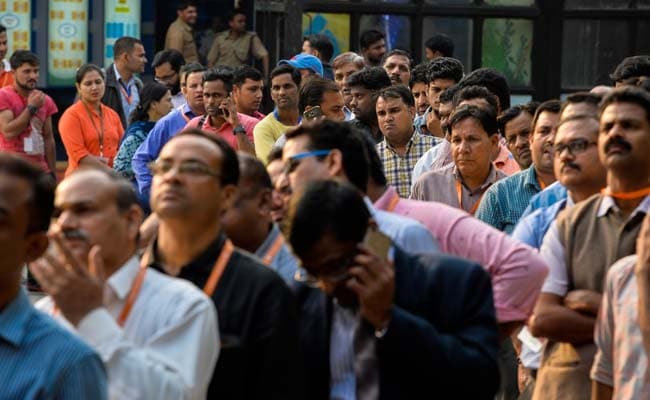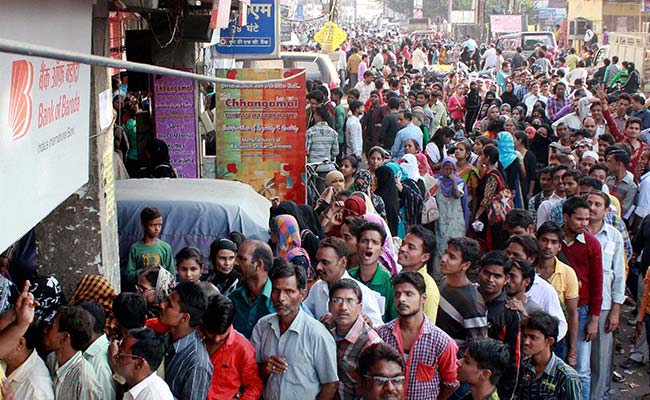- Sophocles
The endless queues at lakhs of bank branches and ATMs in cities, towns and villages across the country; the crushing disappointment when, after hours in line, the shutters come down or the teller says he has run out of cash or the ATM refuses to oblige; the trudge back home to tell one's family that nothing can be bought because there are no small notes left to buy with; or, worse, that there are two notes of Rs 2,000 each, no shopkeeper will give change for such a high denomination; to explain to the children that Papa has lots of money deposited in the bank but there is a Bigger Papa ordering banks to not let Papa take out his own money; brides and grooms left stranded at the threshold of their new lives; children dying because money to buy medicines and medical care has just been rendered worthless; sick elders wasting away while their sons and daughters run from pillar to post trying to exchange their own money for new money; farmers losing out on their current crop after two successive years of drought because no one has the cash flow to buy what Nature has at long last yielded; creditors knocking at the kisan's door because although the harvest is in and godowns are overflowing, they are not getting back a paisa of the advances they have given since but no middleman is buying; the kisan is neither able to discharge his past debt nor able to buy his inputs of seeds and fertilizer for the next season; the pathetic spectacle of women vendors squatting with their tiny stock of withering fruits and vegetables in the midst of deserted mandis and market-places; rikshawallahs and auto-rikshawallahs idling disconsolately because customers desperate to reach their destinations do not have the small notes needed for the fare; labour left initially without wages and subsequently without employment because contractors do not have the means of paying for their hire; rehriwallahs and small retailers forced into twiddling their thumbs; small and micro-businesses folding; memsahibs begging their maids and cooks to not ask for their dues - all this is but a glimpse of the misery being inflicted by Modi on the aam aadmi as he descends to disaster. Why did he resort to this madness?
Character is destiny. What is happening is happening because Modi is who he is: vain, arrogant, self-obsessed, domineering. He wants to be the only one on the stage, the only one on whom the limelight is playing, the sole recipient of all applause. So he insulates himself from advice, fiercely concentrates decision-making in himself, personalizes governance, and projects only himself. It is therefore only he, not even the hapless Jaitley who seems to have been kept entirely out of the loop, who is responsible for the seething anger among the people, the total mass disillusionment with the man they mistakenly elected 30 months ago. He has neither the wisdom nor the training to make revolutionary change nor the administrative acumen to effectively manage the transition. His one talent is speech-making - a characteristic shared by all demagogues from Mussolini to Modi - but while that has its uses as spectacle, it is no substitute for sound governance.
So, why did he do it?
The mid-point of Modi's term is in the offing. People are asking what happened to all the grand promises that won him the Lok Sabha election. Some dramatic gesture was required to keep the opeople's enthusiasm going for another 30 months. Since the pledge of bringing back black money had caught the imagination of the electorate, especially as it came with the promise of all that money finding its way into every single Indian's bank account or pocket, Modi, having drawn a blank on the external front, recognized that black money, however, continued to exercise its fascination. Why not, therefore, divert public attention from bringing back ill-gotten wealth stashed abroad to unearthing domestic black money?

People wait in a queue to withdraw/exchange banned Rs 500 and 1,000 notes from an ATM in New Delhi
And if the strike was to yield rich political dividends, the scalpel must be seen in the doctor's hands. Therefore, the entire operation must be concentrated in The Leader's hands, so that Modi, and Modi alone, gets the full credit. So, almost no expertise might be consulted. And for full theatrical impact, the move must be shrouded in such secrecy that when it came, people's minds would be jolted. Hence, few, if any, preparatory measures were taken. Shock and awe was expected to make up for that.
Had he asked or listened (which he has not done since infancy), someone might have whispered that what he planned to do would instantly sterilize 86% of the value of all money in circulation. This would immediately result in seizure - of income, savings, investment, trade, livelihood. Or had he been to University and paid any attention to what was being taught in the classroom, he might have picked up the first sentence of Robertson's Money, required first-year reading: "Money is a means of exchange and a store of value." If, therefore, you propose to freeze money supply, leaving a mere 14% of value in active circulation, you must have the alternative currency in readiness to promptly replace what is being withdrawn. Otherwise, you will hit all productive economic activity.

Many ATMs are running out of cash because of huge pressure of withdrawal
Of course, the rich know their way around. Hence, their advice to both India and Mauritius that if Modi's honour is to be boosted by renegotiating the India-Mauritius double taxation avoidance treaty, by all means do so, but do not give in on Participatory Notes (PNs) which guarantee anonymity to PN inflows from Mauritius. So, Indian black money salted abroad can always be "round-tripped" home through conveniently anonymous PNs.
So also with the new Rs 2,000 notes. Once the present brouhaha ends, it will be twice as easy to undertake under-the-table transactions, for single notes now will be twice the value of the old discredited Rs 1,000 notes. Thanks to that sleight of hand, twice the old value can be stuffed into attaché cases the same size as the past. Meanwhile, let the unwashed janata suffer. We're OK, Jack.
St. Bernard of Clairvaux warned in the twelfth century: "The road to Hell is paved with good intentions." Being a saint, he must have had in mind Narendra Modi and Black Money.
(Mani Shankar Aiyar is former Congress MP, Lok Sabha and Rajya Sabha.)
Disclaimer: The opinions expressed within this article are the personal opinions of the author. The facts and opinions appearing in the article do not reflect the views of NDTV and NDTV does not assume any responsibility or liability for the same.


